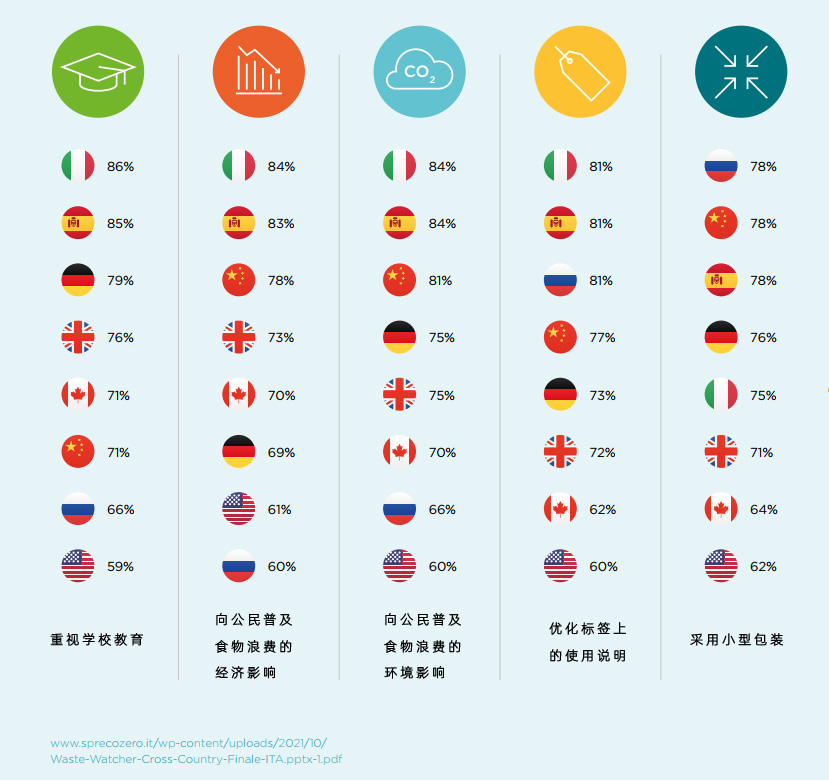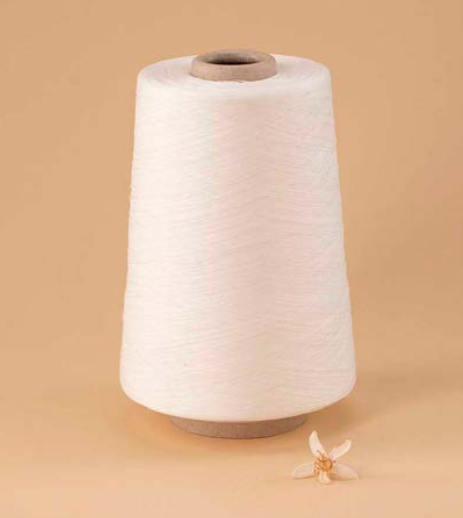Improving awareness and the right behaviour are weapons to combat domestic food waste. It is up to research and industry to give a second life to waste materials. And governments to educate their citizens in correct behaviour.
对抗家庭食物浪费最好的办法是提高公民意识、普及正确做法。科研机构和制造业应考虑循环利用浪费掉的食物,而政府则要正确引导公民的行为。
2015年,联合国通过了《2030可持续发展议程》,该议程第12.3条体现了抵制食物浪费的相关行动。要想减少食物浪费,关键在于改变消费者的行为。

HOW TO REDUCE WASTE: WHAT THE PUBLIC WANT
如何减少浪费:想公众之所想
In houses around the world food is wasted in similar ways. But the solutions for combating this paradoxical food loss at the domestic level are also cross-border and shared, at least according to the statements of those interviewed by the Cross Country 2021 survey carried out by Waste Watcher International Observatory. More food education in schools and to the public is the most shared proposal by the people of eight countries questioned, and held to be useful in developing greater knowledge about food waste and to incentivise virtuous behaviour to reduce this phenomenon at the domestic level. Holding this opinion are 86 in 100 people in Italy and Russia, 85 in Spain and 8 out of 10 in Germany and the United Kingdom. There is a certain consensus also around initiatives to raise awareness on climate and economic damage caused by waste, and proposals such as creating information labels on the correct use of products. After this, in the opinion of the interviewees, smaller packages are helpful, while the idea of an anti-waste tax linked to the squandering of food is less popular.在世界各地的家庭中,人们浪费食物的方式大抵类似。根据Waste Watcher国际观测站《2021全球食物浪费调研报告》的结果,要想抑制来自家庭的不必要的食物浪费,应对方法也是世界通用的。在八个受访国家中,人们最赞同的方法是,在学校和公众中开展更多的食物教育。人们认为,这有助于让公众了解到更多食物浪费的相关知识,培养正确的行为,从而减少家庭食物浪费。在意大利和俄罗斯,有86%的受访者赞同以上观点,在西班牙有85%,德国和英国均为80%。也有一定数量的受访者认为,应普及浪费带来的气候和经济影响,从而引起人们重视;还有受访者表示,可以在产品标签上标明正确的食用方法。除此之外,受访者觉得小型包装有助于减少浪费;而通过出台反浪费税来减少浪费的做法则不太被受访者认可。
“Let us all shop carefully, cook creatively and make wasting food anywhere socially unacceptable while we strive to provide healthy, sustainable diets to all.”
我们致力于让每个人都拥有健康、可持续的饮食习惯。为此,请大家理智购物、探索料理新花样,杜绝食物浪费。
Inger Andersen - Executive Director - United Nations Environment Programme, March 2021
A NEW LIFE FOR WASTE
变废为宝
The recovery of industrial waste offers great development opportunities for companies and savings for non-renewable resources. For some time, the agri-food processing and production chain has been studying systems to reuse often large quantities of processing waste, which finds its way back into the production process in the form of components for animal feed, fragrances for cosmetics, edible packaging, compostable plastics. Or textile fabrics. 工业废料的回收蕴含巨大商机,同时还能节约不可再生资源。一段时间以来,农业食品加工链和生产链一直在探索重复利用加工过程中产生的大量废料的方法,以让废料重新进入生产环节,并最终成为动物饲料、化妆品香料、可食性包装和可堆肥塑料,甚至纺织面料。

Orange Fibre就是一个例子。Orange Fibre于2014年在西西里岛的卡塔尼亚成立,该地盛产柑橘。“在意大利,每年生产的柑橘副产品超过70万吨。”Orange Fiber的联合创始人Enrica Arena表示,“副产品是很多加工行业的心头大患,但我们决定变废为宝。”Orange Fiber携手米兰理工大学开发了一种独特的创新工艺,可以将60%的柑橘加工废料用于生产可持续纺织纤维。这种纤维手感柔滑、经久耐用,广泛应用于环保时装界。
版权归奥马冰箱所有,转载请注明出处。





























